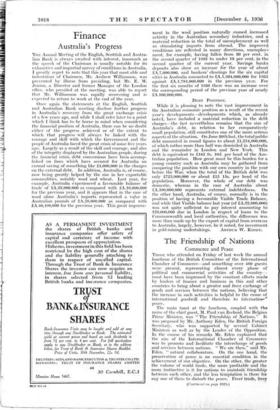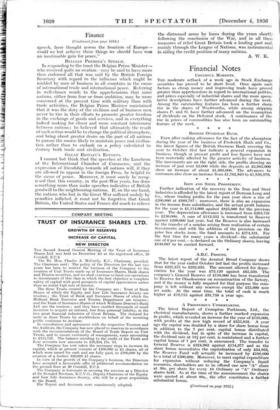The Friendship of Nations
Commerce and Peace
THOSE who attended on Friday of last week the annual luncheon of the British Committee of the International Chamber of Commerce—and something over 460 guestS were present, representing almost every phase of political and commercial_ activities of the country— must have been impressed by the constant efforts mad* by leaders of finance and business in this and other countries to bring about a -greater and freer exchange of goods and services between the nations, believing. that the increase in such activities is helpful to the cause of international goodwill and therefore to internatioPes peace.
The main toast at the luncheon, coupled with the name of the chief guest, M. Paul van Zeeland, the Belgian Prime Minister, was " The Friendship of Nations." It was proposed by Mr. Anthony Eden, the British Foreign Secretary, who was supported by several Cabinet Ministers as well as by the Leader of the Opposition. In the course of his remarks Mr. Eden explained that the aim of the International Chamber of Commerce was to proniote and facilitate the interchange of goods and services between nations. . " We are then," said Mr. Eden, " natural collaborators. On the one hand, the preservation of peace is an essential condition in the achievement of our objective. On the other, the :greater the volume' of world trade, "the• more 'profitable and the more instinctive is it for nations to maintain' friendship between each other, and the- less temptation is there for any one of then-to disturb the peace. Freei- trade, free;
(Continued on page 1020.)
Finance
(Continued from page 1018.)
speech, freer thought across the frontiers of Europe— could we but achieve these things we should have won an inestimable gain for peace."
BELGIAN PREMIER'S SPEECH.
In responding to the toast the Belgian Prime Minister— who received quite an ovation—may be said to have more then endorsed all that was said by the British Foreign Secretary with regard to the influence which might be wielded by men of business in all countries in the cause of international trade and international peace. Referring in well-chosen words to the apprehensions that some nations, either from fear or from ambition, may be more concerned at the present time with military than with trade activities, the Belgian Prime Minister maintained that it was the duty of the civilians and of business men never to tire in their efforts to promote greater freedom in the exchange of goods and services, and in everything indeed making for closer and more constant intercourse between nations ; he believed that ultimately the result of such action would be to change the political atmosphere, and bring about greater desire on the part of all nations to pursue the course likely to maintain peace and civilisa- tion rather than to embark on a policy calculated to destroy both trade and civilisation.
GREAT BRITAIN'S EFFORTS.
I cannot but think that the speeches at the Luncheon of the International Chamber of Commerce, and the expression of friendship towards all nations will, if they are allowed to appear in the foreign Press, be helpful to the cause of peace. Moreover, it must surely be recog- n'sed that this country, in the post-War years, has done something more than make speeches indicative of British goodwill to the neighbouring nations. If, on the one hand, the nations who lost in the Great War suffered unduly by penalties inflicted, it must not be forgotten that Great Britain, the United States and France did much to relieve the distressed areas by loans during the years shortly following the conclusion of the War, and in all these measures of relief Great Britain took a leading part and, mainly through the League of Nations, was instrumental in aiding the credit position of many nations. A. W. K.





















































 Previous page
Previous page